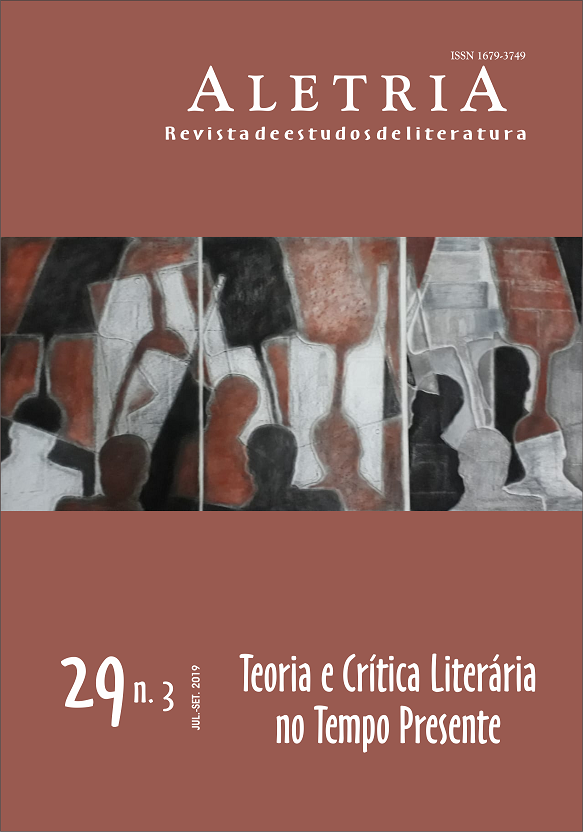Literature Theory and the Inhumanities
DOI:
https://doi.org/10.17851/2317-2096.29.3.21-38Keywords:
literary theory, anti-humanism, post-modernismAbstract
This article aims at analyzing the internal development of Literary Theory as a discipline and its connection with the anti-human perspective of Modern Arts, concept once proposed by the Spanish philosopher Ortega Y Gasset. Such an anti-human perspective can be traced back in the German philosophy of the late 19th and early 20th centuries, especially among authors such as Nietzsche and Heidegger, as well as in its development towards a postmodern French philosophy, as practiced by Michel Foucault and Jacques Derrida. The article brings together a variety of philosophers, sociologists and literary critics who appraise the anti-human trend, notably Luc Ferry and Alain Renaut, Roger Scruton, Eric Voegelin, Daniel Bell, José Guilherme Merquior, Raymond Tallis and Tzvetan Todorov, among others, in order to discuss the role of Literary Theory as part of Humanities, now understood as Inhumanities.
Downloads
References
ACADEMIA BRASILEIRA DE CIÊNCIAS. Rigor e Integridade na Condução da Pesquisa Científica: guia de recomendações de práticas responsáveis. Rio de Janeiro: Academia Brasileira de Ciências, 2013. p. 2.
BELL, Daniel. The Cultural Contradictions of Capitalism. 2. ed. New York: Basic Books, 1996.
FERRY, Luc; RENAUT, Alain. Pensamento 68: ensaio sobre o anti-humanismo contemporâneo. Tradução de Robert Markenson e Nelci do Nascimento Gonçalves. São Paulo: Ensaio, 1988.
FERRY, Luc. A nova ordem ecológica: a árvore, o animal e o homem. Tradução de Rejane Janowitzer. Rio de Janeiro: Difel, 2009.
FOUCAULT, Michel. As palavras e as coisas. 2. ed. Tradução de Salma Tannus Muchail. São Paulo: Martins Fontes, 1981.
FRIEDRICH, Hugo. Estrutura da lírica moderna. Tradução de Marise M. Curioni. São Paulo: Duas Cidades, 1978.
GELLNER, Ernest. Pós-modernismo, razão e religião. Tradução de Susana Souza e Silva. Lisboa: Instituto Piaget, 1994.
MERQUIOR, J. De Praga a Paris. Tradução de Ana Maria de Castro Gibson. São Paulo: Nova Fronteira, 1991.
NIETZSCHE, Friedrich. Assim falou Zaratustra. Tradução de Paulo César de Souza. São Paulo: Companhia das Letras, 2011.
ORTEGA Y GASSET, José. A desumanização da arte. 5. ed. Tradução e prefácio de Ricardo Araújo. São Paulo: Cortez, 2005.
SCRUTON, Roger. Confessions of a Skeptical Francophile. Disponível em: http://www.roger-scruton.com/articles/1-politics-and-society/83-confessions-of-a-sceptical-francophile.html. Acesso em: 11 mar. 2019.
SCRUTON, Roger. Gentle Regrets. New York: Continuum, 2006.
SCRUTON, Roger. Modern Philosophy: an introduction and survey. 2 ed. NYC: Penguin, 1995. Cap. 1: The Nature of Philosophy, p. 1-15; Cap. 30: The Devil, p. 458-480.
TALLIS, Raymond. In Defense of Realism. 2. ed. Lincoln; London: University of Nebraska Press, 1998.
TODOROV, Tzvetan. A literatura em perigo. Tradução de Caio Meira. São Paulo: DIFEL, 2009.
TZVETAN TODOROV – A literatura em perigo. [S.l.: s.n.], 2013. 1 vídeo (1:47 min). Publicado pelo canal Fronteiras do Pensamento. Disponível em: http://www.youtube.com/watch?v=abOhgt_e3-Y. Acesso em: 27 mar. 2014.
VATTIMO, Gianni. O fim da modernidade. São Paulo: Martins Fontes, 1996.
VOEGELIN, Eric. Hitler e os alemães. Tradução de Elpídio Mário Dantas Fonseca. São Paulo: É Realizações, 2008.
Downloads
Published
How to Cite
Issue
Section
License
Copyright (c) 2019 Marcus Vinicius de Freitas (Autor)

This work is licensed under a Creative Commons Attribution 4.0 International License.
Authors who publish with this journal agree to the following terms:Authors retain copyright and grant the journal right of first publication with the work simultaneously licensed under a Creative Commons Attribution Non-Commercial No Derivatives License that allows others to share the work with an acknowledgement of the work's authorship and initial publication in this journal.Authors are able to enter into separate, additional contractual arrangements for the non-exclusive distribution of the journal's published version of the work (e.g., post it to an institutional repository or publish it in a book), with an acknowledgement of its initial publication in this journal.Authors are permitted and encouraged to post their work online (e.g., in institutional repositories or on their website) prior to and during the submission process, as it can lead to productive exchanges, as well as earlier and greater citation of published work (See The Effect of Open Access).





